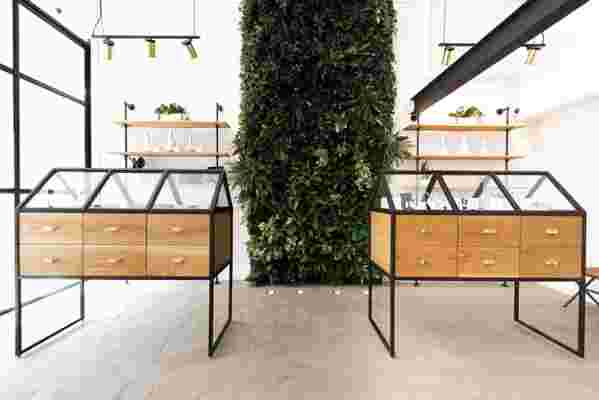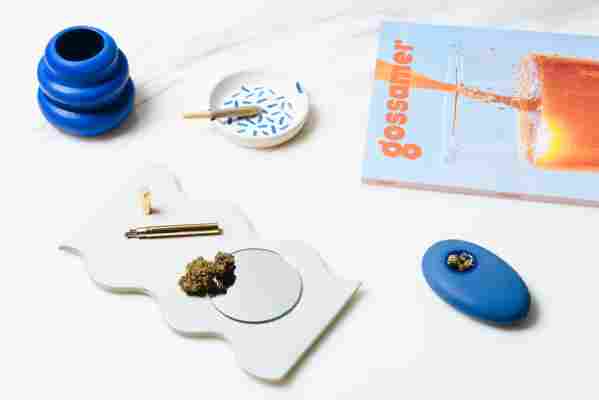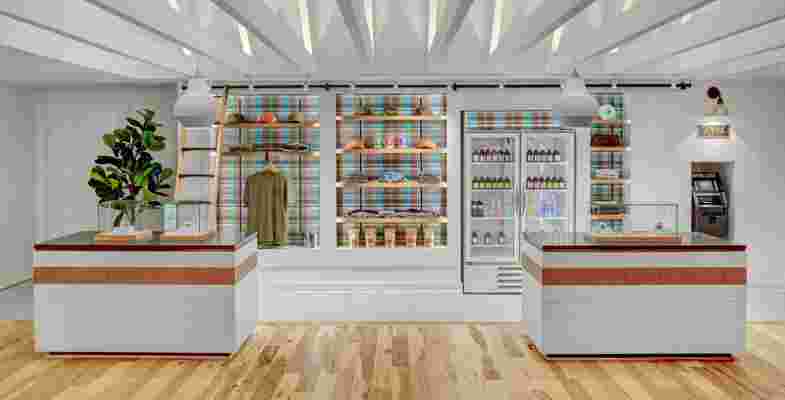Since California voters passed a proposition to allow the use of medical marijuana in 1996, 30 more states and Washington, D.C., have followed suit. Of those, nine have also legalized it for recreational use. In October of this year, Canada became the second country to legalize recreational cannabis nationwide. (Uruguay did so in 2013.) And with it's emergence from the shadows of the law, marijuana is getting a total makeover.
Take, for example, Lowell Herb Co., a California-based farm, which brings a bucolic farm-to-table concept to its brand. Their Instagram-worthy, organic products are wrapped in rustic-chic packaging, while their one-ounce cannabis bouquet is a charming mix of eucalyptus, greens, and still-on-the-stem pot flowers. Bloom Farms' describes their Rose Gold Highlighter Plus vape pen as “a luxury fashion accessory.” In addition to its discreet design and pretty metallic finish, it's engineered with a ceramic filter and BPA-free cartridge just right for the health-conscious hipster. Beboe, which sells luxury vaporizer pens and pastilles candies, has been described by The New York Times as the “Hermès of Marijuana.”

Serra, in Portland, sells a range of high-design cannabis accessories in a stylish retail setting.
Accessories, too, are getting an overhaul. Serra—a high-end dispensary with two locations in Portland, Oregon, where both medical and recreational marijuana sales are legal—sells beautiful bongs , artisanal pipes , and even utilitarian avant-garde art that any weed-loving design enthusiast would be proud to display. Here, shoppers can also pick up a contemporary necklace with a geometric charm that doubles as a tool for tamping joints. Pax vapes , which have been called the “iPod of vaporizers,” are sleek, efficient tools with rechargeable batteries and a companion app that allows users to control the mechanism for precise temperature and even lock it against unwanted use. (Handy if you have, say, teenagers in your household.)

A few of the products for sale at Serra.
But no area of cannabis culture has seen (or needed) a bigger change than the interiors of dispensaries, which have traditionally been more like high-security vaults than chic retail lounges. At Serra's two locations, clean and minimalist interiors are flooded with natural light from windows that look out to (and in from) the surrounding neighborhoods. The look is elegant, but also welcoming. Diego Pellicer , which has locations in Seattle and Denver, went for a high-rolling, cigar-shop-like effect, designed by internationally acclaimed architect Michael Rotondi and former Apple creative director Jill Savini. Meanwhile, one of the industry's biggest brands, MedMen, has opened 14 stores throughout the U.S., many in famous shopping districts including New York City's Fifth Avenue and Las Vegas, where a second shop opened in October (a third is planned for 2019).
One design firm, High Road Studio , specializes exclusively in the cannabis industry. Founder Megan Stone, who worked in dispensaries during design school, recognized the need for improved spaces. She wondered why microbreweries, wine shops, and even frozen yogurt cafés were getting overhauled, while dispensaries still felt “seedy and gross.” Since 2013, she's designed and done branding work for 50 dispensaries in 15 states and Canada.

High Road Studio designed Gnome Grown's bright and colorful showroom in Oregon City, Oregon.
Stone, who is based in Arizona, designs spaces that are inviting, welcoming, and secure, but not overly exclusive. At Maitri , in Uniontown, Pennsylvania, for example, she created a secure glass vestibule through which customers pass into a comfortable lobby decorated in jewel-tone colors. Consultation rooms, where patients can discuss their personal needs, offer discretion, but are enclosed with glass. Since orders must be filled in the back of the house, a wall of false drawers behind the checkout counter reveals a hidden pass-through, delighting customers when their orders are ready. In one corner, an ATM—something of a necessity, as most dispensaries only trade in cash —is encased by what Stone describes as a “tunnel of ribbon.” Overall, the space creates a memorable experience for the customer, explains Stone, but is also functional, secure, and efficient.
The reception desk at Maitri Medicinals in Pennsylvania, another High Road Studio project.
In all of her projects, Stone aims to pay homage to the culture and history of the cannabis industry, as well as its hard-fought battle to become mainstream. “There's a different angle people need to see this industry through,” she says. “Every space I design is a chance to change people's minds about it.”
RELATED: 7 of the Best-Designed Marijuana Shops Across America
